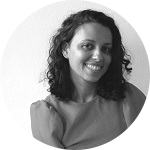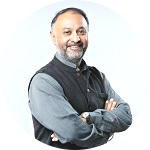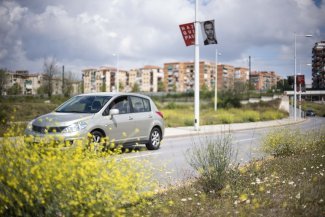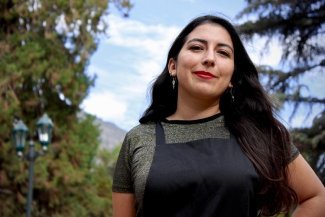

A man casts his vote during the presidential and legislative elections at a polling station in San Salvador on 4 February 2024. With over four billion people heading to the polls during the course of this year, 2024 has been dubbed the ‘super-election year’ but many elections will be less free and transparent than the winners want us to believe.
2024 is a year of elections. Half the world’s population will head to the polls, from big countries like India, Indonesia and the United States to small nations like Austria, Botswana and Tunisia.
But a year of elections doesn’t necessarily mean a year of democracy. That’s because civic space – a key ingredient of democracy which enables the political opposition, independent media, active citizens and civil society organisations to critique decision makers’ actions – is at a historic low.
Recently released research from the CIVICUS Monitor, which tracks civic space conditions around the world, shows that a whopping 86 per cent of people live in countries with restricted civic space, meaning authorities clamp down on fundamental freedoms of assembly, association and expression. We rate such countries as ‘obstructed,’ ‘repressed,’ or ‘closed.’ Nearly a third of the world’s population – 31 per cent –live in the worst category ‘closed.’
Meanwhile, just 2 per cent of people live in ‘open’ societies – where governments not only respect but protect civic space. Another 12 per cent live in countries with ‘narrowed’ civic space, where rights are respected but occasionally violated.
These are the worst figures we have seen since we started keeping track six years ago. They indicate that although most countries have embraced the ritual of elections, the quality of democracy on offer is poor. In short, many elections in 2024 will be less free and transparent than the winners want us to believe.
There’s no democracy in closed civic spaces
We can start by looking at countries rated ‘closed.’ These nations are essentially one-party states where governments suppress political opposition so tightly that elections are a farce.
The first election of 2024, held in Bangladesh, was a classic example. Bangladeshi authorities arrested tens of thousands of opposition members and protesters ahead of the 5 January vote, while police and ruling party members attacked demonstrators, leading to multiple deaths. Facing such a relentless onslaught, the main opposition party boycotted the polls, and Prime Minister Sheikh Hasina held onto power. The regime also targeted human rights activists and their families with intimidation, prosecution and funding restrictions.
Bangladesh is similar to other ‘closed’ countries, where expressions of democratic dissent carry immense risks. In Russia, Vladimir Putin will likely sail through March elections to extend his more than two-decade grip on power after jailing dissidents of all stripes. Likewise, in Venezuela free elections appear implausible with the lead opposition candidate Maria Corina Machado disqualified. Civil society and independent media face constant pressure not to critique government actions.
When repression takes root, elections suffer
While ‘closed’ countries have the worst civic space, not far behind are ‘repressed’ nations. In such places, ruling elites use elections to project an illusion of democratic practice, but incumbents maintain a monopoly on power. Observers should be clear-eyed about the political realities.
For instance, in India – dubbed ‘the world’s largest democracy’ –Prime Minister Narendra Modi is a textbook example of an authoritarian populist who actively uses disinformation to pursue political objectives. His Bharatiya Janata Party government has whipped up nationalist religious fervor against minorities and weaponised law enforcement agencies to marginalise political opponents and censor journalists. Several human rights organisations have had to halt their work due to funding restrictions and cases lodged against them. It is thus hard to see a fair vote during India’s elections in April and May.
The situation is worse in neighbouring Pakistan, where the army controls almost everything, including who gets to run for office on 8 February. The electoral commission banned the jailed former prime minister’s party, rejected its candidates and restricted internet access during opposition events.
Meanwhile, Rwanda’s long-standing president Paul Kagame will almost certainly win another seven-year term in July in a country where journalists and dissidents are routinely jailed, forced into exile or even killed. Over in Senegal, the vote –postponed indefinitely as of this writing – will likely result in an establishment candidate winning after police imprisoned popular outsider Ousmane Sonko and shot his supporters in the streets.
Tunisia’s November election also looks to fall well short of democratic standards after President Kais Saied changed the constitution to control parliament and concentrate power in his hands.
Still, ‘repressed’ countries can surprise us. Last August, Guatemala’s progressive, non-establishment candidate Bernardo Arevalo won the vote, and a mass peaceful protest movement successfully resisted attempts by elites to overturn the results. Guatemala proves that people power can overcome enormous odds.
Obstructed, but not lost
But Guatemala is a rare case, so it’s the next set of countries, with ‘obstructed’ civic space, where voters might exercise some choice despite attempts by incumbents to sway the results in their favor. For instance, Brazil’s 2022 electoral ouster of far-right president Jair Bolsonaro who flouted constitutional norms shows how an ‘obstructed’ country’s citizens and institutions can withstand pressures on democracy.
British voters have a chance to do just that when they choose a new government in late 2024. The United Kingdom has experienced a steady erosion of the rights of peaceful protest and civil disobedience during more than a decade of Conservative leadership. Citizens thus have an opportunity this year to bring their government back in line through the ballot.
South African voters might also halt a worrying trend during May elections. While South Africa’s hard-won democracy is not under threat 30 years after Apartheid, intimidation of journalists exposing corruption scandals within the ruling African National Congress party and the murders of numerous activists have sullied the country’s civic space. South Africans, including ANC supporters, can use the election to demand their leaders show more respect for the constitution.
But things can go the other way if citizens of some ‘obstructed’ countries elect rulers with authoritarian tendencies. In El Salvador, voters reelected Nayib Bukele on 4 February amidst a crackdown on criminal gangs has undermined civic space and the independence of the judiciary. And in Indonesia, the candidacy of a former military commander implicated in human rights violations has raised fears among civil society about their country’s future.
Contests in free civic spaces
Though the global picture looks bleak, 2024 will include a handful of elections in countries with ‘narrowed’ and ‘open’ civic spaces. In these places, observers can expect free, fair polls. Already, Taiwan’s January vote provided space for competition among diverse actors across the political spectrum. Austria, Lithuania and Uruguay are other ‘open’ countries with polls this year.
But perhaps 2024’s most consequential election will be in the United States, rated ‘narrowed.’
Though the country’s democratic institutions have mostly withstood attacks from former president Donald Trump, numerous US states have passed laws restricting speech in schools and protest rights. Meanwhile, the violence of 6 January 2021– when Trump supporters stormed the Capitol – looms large.
Indeed, Trump returning to power would be terrible for civic space in the US. During his presidency, CIVICUS Monitor documented a clear increase in attacks on free speech, especially press, plus violent crackdowns on protesters. A second Trump presidency would also have negative international ramifications given Washington’s outsized global influence.
Turning the tide
Pushing more countries toward democracy in 2024 is no easy task. But there are a number of steps which might improve the current situation.
To start, scrutiny from watchdogs is necessary to hold the line. Domestic civil society and independent media must serve as monitors and demand transparency from the powerful. That includes calling out disinformation, which is an increasingly dangerous authoritarian tool to undermine the credibility of elections. Likewise, organised mass movements, like the one in Guatemala to defend electoral results, can help overcome the power of entrenched interests.
However, civil society, media and protests cannot always succeed on their own in heavily restricted environments. Multilateral institutions, neighbouring countries and democratic states must therefore push malevolent actors to respect democratic principles.
But waiting to act until the voting finishes can be too little too late. External pressure such as diplomatic engagement and international monitoring should take place before, during and after the vote – right up until the next government swears in. Against authoritarianism, prevention is far better than cure.
Unfortunately, the global backslide on civic space means international pressure for democracy is weaker than ever. Global governance institutions don’t have the strength, or in some cases the will, to call out authoritarians abusing their power.
That leaves another crucial force: people-to-people solidarity. Grassroots activists and civil society groups abroad can participate in solidarity actions to support people on the ground. They can also amplify messages through protest and on social media to raise awareness about oppression affecting election integrity. Further, they can push their own governments to take principled, informed positions, and call out any multinational corporations and interests benefiting from unfree votes.
Such movements, which recognise the intersectionality of struggles for rights across borders, are perhaps the most potent force of all to make 2024 not just a year of elections, but a year of democracy.











